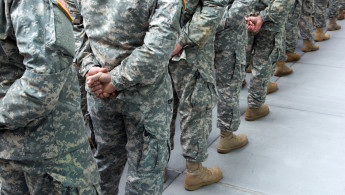US stopping soldiers from travelling to Middle East over Covid
The US is stopping its soldiers from visiting countries in the Middle East, including its key ally Israel, in a move intended to curb the spread of Covid-19.
The US military's Central Command (CENTCOM) made the decision on 8 September last year, a week after Israel was added to the body's remit, The Times of Israel reported on Wednesday.
The rule bans "unofficial travel", such as holidays trips or visits by reservists resident in Israel to see relatives.
It impacts those serving in any branch of the military and covers Israel and all other states falling under CENTCOM, such as Syria, the UAE, Egypt, Lebanon, Jordan and Iraq.
Before this, the only countries to which such visits were banned were Iran, Syria, Afghanistan, Iraq and Yemen, where there were either serious conflicts or governments antagonistic to the US.
While approval was required, this was easy to come by, The Times of Israel said.
Though US servicemen and women can ask for an exception to the current rule, it is improbable that they will be able to secure this, according to the Israeli news site.
CENTCOM press lead Karen Roxberry said: "The changes… to Central Command Regulation (CCR) 55-2 were implemented in direct response to heightened COVID-19 restrictions throughout our area of responsibility.
Bringing home the hummus: How MENA's food delivery industry reaped the rewards of post-COVID eating habits https://t.co/o0qM7pMteu
— The New Arab (@The_NewArab) March 1, 2022
"Any correlation between the Defense Department's announcement of Israel's realignment to US Central Command's responsibility in September 2021 is purely coincidental."
Her comments come despite other parts of the world experiencing worse levels of coronavirus infections than those under CENTCOM, The Times of Israel added.
Israel was not advised of the rule update by Washington, according to an Israeli foreign ministry spokesman cited by Haaretz.
The Israeli army told Haaretz it would check but could not instantly verify if it had been told.





 Follow the Middle East's top stories in English at The New Arab on Google News
Follow the Middle East's top stories in English at The New Arab on Google News
![The UAE is widely suspected of arming the RSF militia [Getty]](/sites/default/files/styles/image_330x185/public/2024-11/GettyImages-472529908.jpg?h=69f2b9d0&itok=Yauw3YTG)
![Netanyahu furiously denounced the ICC [Getty]](/sites/default/files/styles/image_330x185/public/2024-11/GettyImages-2169352575.jpg?h=199d8c1f&itok=-vRiruf5)
![Both Hamas and the Palestinian Authority welcomed the ICC arrest warrants [Getty]](/sites/default/files/styles/image_330x185/public/2024-11/GettyImages-2178351173.jpg?h=199d8c1f&itok=TV858iVg)